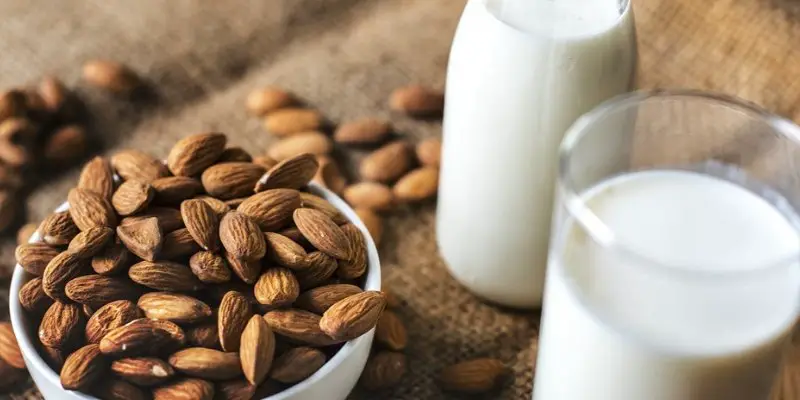Most animals, your dog included, are supposed to tolerate milk from mammals only when they are little. Pet experts, like the American Society for the Prevention of Cruelty to Animals, do not advice giving milk to adult dogs as they do not have enough enzymes to digest the lactose, turning lactose intolerant as soon as they are not puppies anymore. But what about almond milk? This drink prepared from almonds. It’s low in fats but high in proteins and fiber. As per the USDA (United States Department of Agriculture), almonds (and, almond milk, as follows) are loaded with nutrients like calcium, magnesium, iron, phosphorus, potassium, zinc, niacin, Vitamin B6, riboflavin, and doesn’t have any lactose. Sounds good, right?

Can dogs drink almond milk?
Technically yes. But, surprisingly, it won’t be adding any benefits to your dog’s diet. If your pup is not allergic to almond milk and drinks a bit every once in a while, it won’t cause any troubles. But because canines are not designed to break down nutrients from almonds, the nut drink can hardly be useful for them. Therefore, it’s just a pricy supplement to their nutrition plan. And aside from being new and different, almond milk won’t add any value to your pup’s health.
Plain almonds can lead to various digestive upsets, vomiting or diarrhea when eaten in significant quantities. And giving your dog almond milk is pretty much the same as if you were feeding him with highly diluted nuts (it’s about a handful of almonds per 200 ml glass of milk).
You might also like:
Can Dogs Eat Almond Butter (Vet’s Comments Included)
Can Dogs Have Almonds?

Is almond milk bad for dogs?
Almond milk in its pure form is harmless for dogs. But if we are talking about its flavored versions, your dog might be in danger.
Here’s the list of ingredients you have to avoid:
- Carrageenan. Originated from seaweed, this is usually used to thicken some muggy food products. As stated by the report from the Cornucopia Institute, this element may induce gastrointestinal inflammation which may lead to more severe diseases, including cancer. It is generally used in dairy and alternatives products like soy, coconut, and almond types of milk.
- Chocolate. It contains theobromine, an ingredient that people can efficiently digest but the same task is way more challenging for dogs. Even the tiniest bit of chocolate can cause your dog lots of digestive struggles. So pass on chocolate versions of any product when considering feeding it to your dog.
- Gums. Food companies use various types of the component as thickeners. You can spot gellan gum, guar gum or locust bean gum in soy milk. Overall it’s safe for your dog, but better pass on this one too. As there’s always a risk that your pet will end up with diarrhea.
- Xylitol.when purchasing almond milk, double check the list of contents for xylitol. Often utilized as a sugar replacement xylitol is very toxic for your dog. It gets right into pet’s bloodstream and causes the rapid release of insulin, and their sugar level will drop in 10 minutes or so. This condition, called hypoglycemia, can be lethal for your pet.

Can puppies drink almond milk?
Veterinarian Merliza Cabriles, DVM believes that puppies should be raised on their mother’s milk, not nut substitutes. If mom isn’t giving enough milk, you can always use an expert puppy formula alternately (e.g. one). It will be created to include all the nutrients your pup needs.

Almond milk for dogs. Summary
A bit of plain almond milk won’t harm your dog. But it has no nutritional value, and there are tons of others more superior treats that you would instead be serving your pup. Canines are having a hard time breaking down almond milk components. And on top of that even finding that plain, free of toxic elements, almond milk might be a riddle. There’s that makes unsweetened almond milk with zero percent sugar (no sweeteners) but it still uses preservatives, and the product only contains 2% almonds. Milk with more sugar and even less almond won’t do your pet any good.
Credits: thanks for the cover photo to rawpixel from Pixabay


